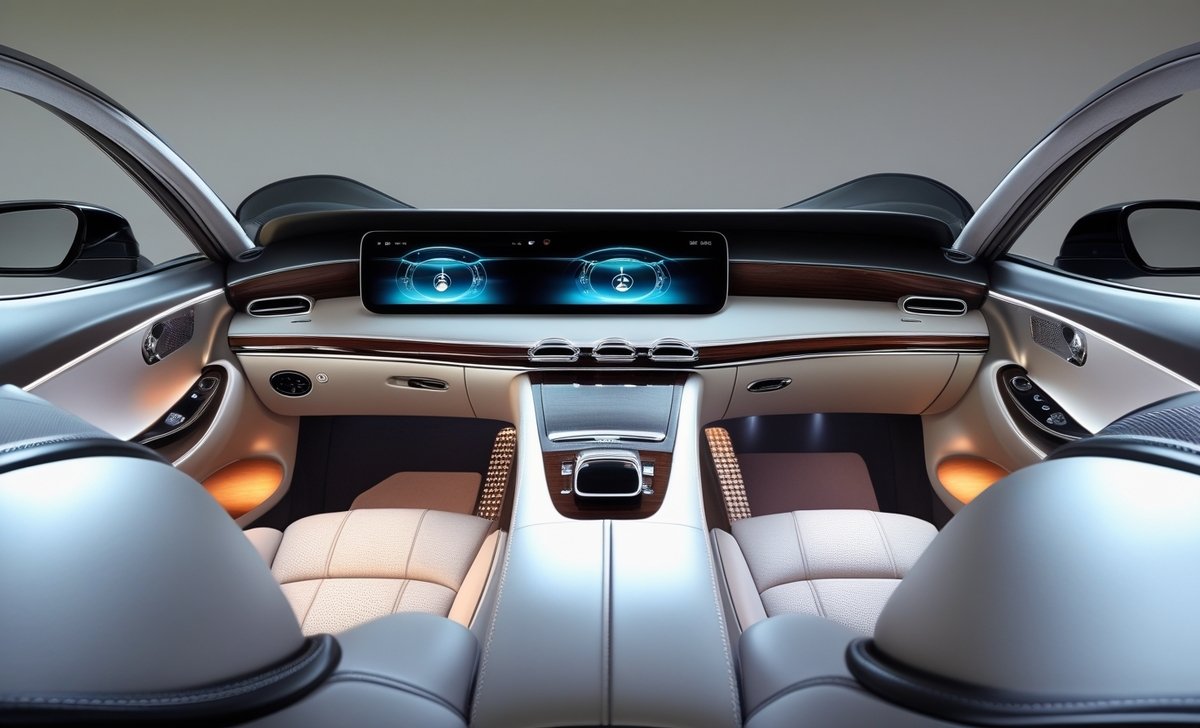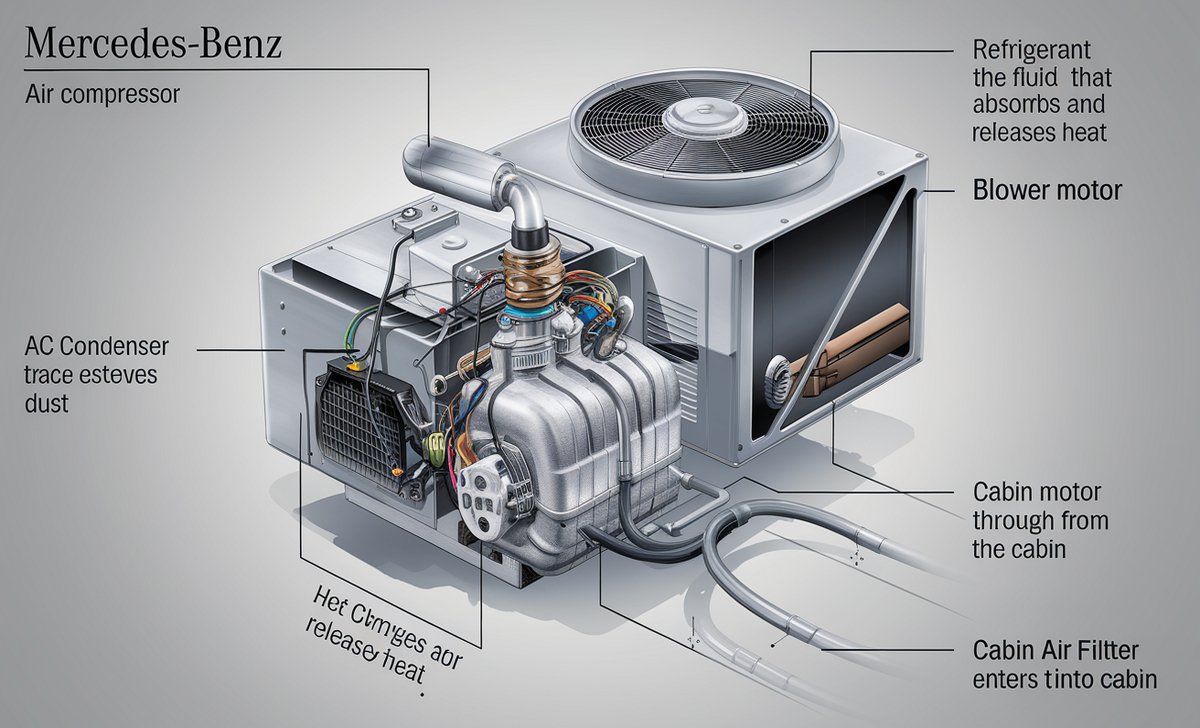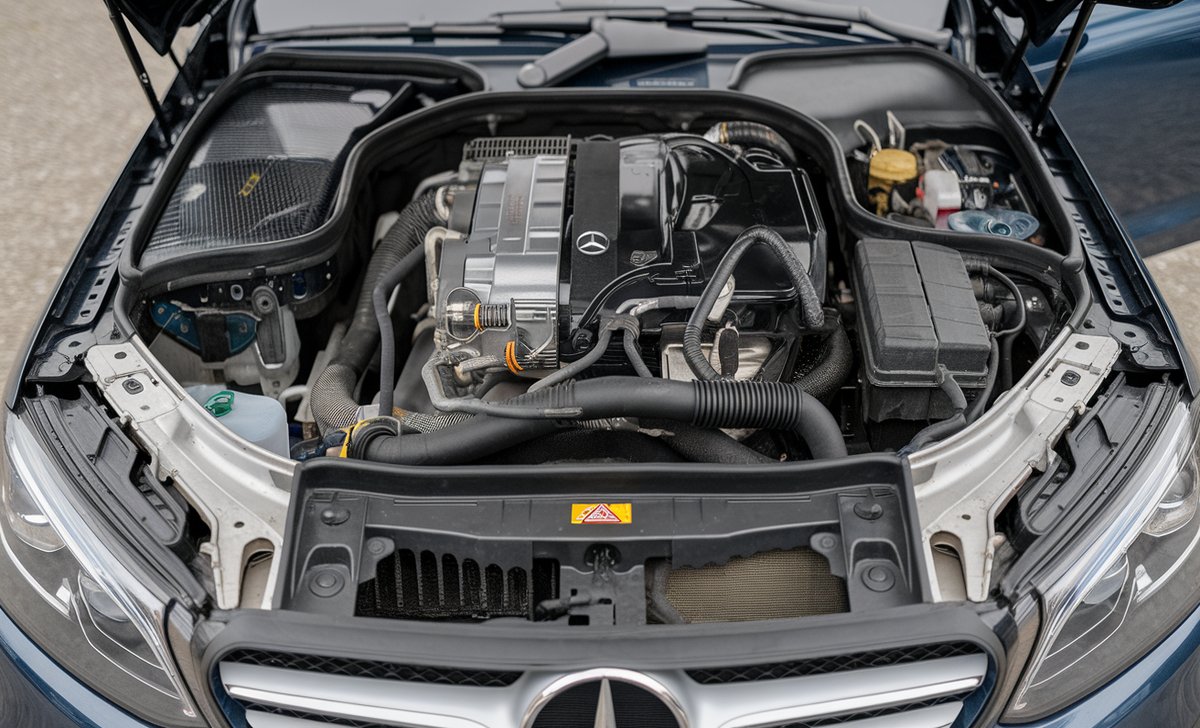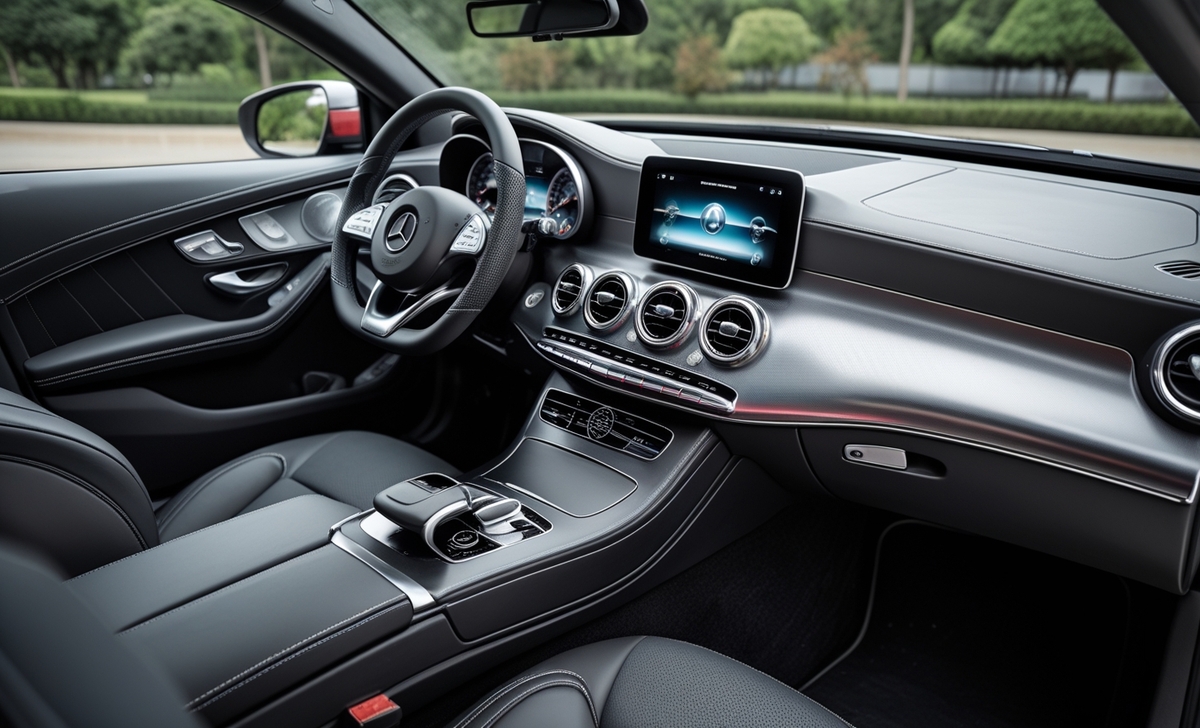Many Mercedes-Benz models feature automatic climate control, which regulates temperature, fan speed, and airflow to ensure a comfortable cabin climate.
The air conditioning system is crucial in creating that optimal driving experience when considering luxury and comfort in a Mercedes-Benz vehicle.
Mercedes-Benz uses CO2-charged R744 compressors in their air conditioning systems. The R744 compressor has a 31cc capacity, which is one-fifth of the PX R134a compressor it replaced. This shift aims to improve environmental sustainability.
We’ll dive into the Mercedes air conditioning system’s components, functions, and unique features to help you understand its significance and keep it functioning at its best.

Key Takeaways:
- Mercedes-Benz air conditioning systems provide luxury and efficiency with precise temperature control.
- Features like dual-zone climate control and automatic climate systems enhance comfort.
- Key components: AC compressor, refrigerant, blower motor, and cabin air filter.
- Regular maintenance ensures optimal system performance and comfort.
Overview Of Mercedes Air Conditioning

Mercedes-Benz air conditioning systems feature to deliver optimal comfort, offering precise temperature control for both the driver and passengers. Whether cooling the cabin on a hot day or providing warmth in winter, Mercedes excels in climate control.
The AC compressor in a Mercedes-Benz can last between 8 to 10 years or around 60,000 to 100,000 miles, depending on usage and model.
Systems like THERMATIC and THERMOTRONIC allow for customized settings, ensuring a personalized experience. Key components such as the AC compressor, refrigerant, blower motor, and AC condenser work together to maintain the desired temperature, making Mercedes vehicles synonymous with luxury and efficiency.
Unique Traits Of Mercedes Air Conditioning

Mercedes-Benz air conditioning systems are popular for their luxury, efficiency, and cutting-edge technology. Unlike many standard systems found in other vehicles, Mercedes offers features designed to provide exceptional comfort and performance. Some of the unique traits that set Mercedes-Benz air conditioning apart include:
- Dual-Zone Climate Control: Many Mercedes-Benz models feature dual-zone climate control, allowing both the driver and the passenger to independently set their preferred temperatures, ensuring personalized comfort for everyone in the vehicle.
- Thermal Comfort: The Mercedes air conditioning system quickly and efficiently adjusts the cabin temperature, providing a consistently comfortable environment for passengers, regardless of the ambient temperature outside.
- Automatic Climate Control: With systems like THERMATIC and THERMOTRONIC, the air conditioning system automatically maintains the set temperature, ensuring that the cabin remains comfortable without requiring constant adjustments.
- Sustainability and Efficiency: Mercedes has focused on enhancing the efficiency of its air conditioning systems, utilizing advanced refrigerants and compressors that use less power while minimizing the vehicle’s environmental footprint. This commitment to sustainability ensures both comfort and eco-friendliness.
Components Of The Mercedes-Benz Air Conditioning System

1. AC Compressor
The AC compressor is the heart of any air conditioning system. In Mercedes-Benz vehicles, the air conditioning compressor compresses the refrigerant gas and sends it into the condenser.
The engine powers the AC compressor and operates based on signals from sensors that monitor the cabin’s temperature and system pressure. If you notice warm air instead of cold air coming from your Mercedes air conditioning, a malfunctioning AC compressor could be the culprit.
2. Refrigerant
The refrigerant in your Mercedes-Benz air conditioning system is a substance that changes pressure to absorb and release heat. The AC refrigerant flows through the system, moving from the compressor to the condenser, evaporator, and back again.
Over time, refrigerant leaks can occur, leading to reduced cooling capacity. If your system isn’t producing cool air, it’s essential to have the refrigerant levels checked and topped up during routine maintenance.
3. AC Condenser
The AC condenser works alongside the compressor to cool the hot, pressurized refrigerant gas. The Mercedes-Benz AC condenser cools the refrigerant and turns it into a liquid form, then sends it to the evaporator to cool the cabin. If the AC condenser becomes clogged or damaged, the system will struggle to cool the air, and you may experience insufficient cooling.
4. Blower Motor
The blower motor in your Mercedes-Benz car controls the airflow through the cabin. It draws in air from outside, circulates it through the air conditioning system, and then blows it into the cabin through the air conditioning vents. If you experience low or no airflow, the blower motor could malfunction, and the motor or fuse may need to be repaired or replaced.
5. Cabin Air Filter
The cabin air filter helps clean the air entering the vehicle, filtering out dust, pollen, and other allergens. A clogged or dirty filter can reduce airflow and make your air conditioning system less effective. Replacing the cabin air filter as part of your air conditioning service is crucial to ensure efficient performance.
How Mercedes-Benz Air Conditioning System Works

Mercedes-Benz air conditioning systems are designed for efficiency and luxury. When the system is turned on, the AC compressor pressures the refrigerant. The refrigerant flows into the AC condenser, where it’s cooled and condensed into a liquid.
This liquid refrigerant then flows to the evaporator, where it absorbs heat from the cabin air, cooling the interior of the vehicle. The cool air is then blown into the cabin by the blower motor. In Mercedes-Benz vehicles with dual-zone climate control, the passenger side can have a separate temperature setting, allowing individual preferences for driver and passenger.
The AC system can also be adjusted to provide warm air if the weather changes, and it is designed to react efficiently to temperature variations.
Common Mercedes-Benz Air Conditioning Problems

Over time, even the most reliable air conditioning systems can experience issues. Mercedes-Benz air conditioners are no exception, and addressing common problems early can prevent further damage and restore comfort. Here are some of the most frequent air conditioning problems:
- AC Compressor Failure: Can lead to a complete loss of cool air; look for strange noises or poor cooling performance.
- Refrigerant Leaks: A drop in refrigerant levels can reduce efficiency and cause warm air to blow from vents.
- Clogged Cabin Air Filter: Reduces airflow, impacting system performance and air quality.
- Blower Motor Issues: A faulty motor results in low or no airflow, affecting cabin temperature control.
- Sensors Malfunction: Faulty temperature and pressure sensors can cause inaccurate system behavior.
Routine Maintenance For Mercedes-Benz Air Conditioning System

To ensure your Mercedes-Benz air conditioning system remains in peak condition, routine maintenance is crucial. Regular check-ups and timely repairs can prevent system malfunctions and improve efficiency. Here are some essential maintenance tasks for keeping your air conditioning system running smoothly:
- AC Recharge: Recharge refrigerant levels to maintain optimal cooling efficiency.
- Check for Refrigerant Leaks: Inspect for leaks and seal them to ensure proper cooling.
- Replace Cabin Air Filter: Regularly replace the cabin air filter to maintain airflow and air quality.
- Inspect AC Condenser and Compressor: Ensure the condenser and compressor are functioning properly and free of blockages.
Conclusion
Mercedes-Benz air conditioning systems combine luxury, efficiency, and advanced technology to provide a comfortable driving experience year-round. With components like the AC compressor, refrigerant, and blower motor, the system ensures optimal climate control.
Regular maintenance, such as checking refrigerant levels and replacing the cabin air filter, is crucial for maintaining system efficiency and performance.
FAQs
1.Why Is My Mercedes Air Conditioning Blowing Warm Air?
There are several reasons why your Mercedes-Benz air conditioner might blow warm air. The most common issues include a refrigerant leak, a malfunctioning AC compressor, or a clogged cabin air filter.
High pressure in the system or faulty sensors can also cause inefficient cooling. It’s essential to regularly check for these issues to maintain a comfortable temperature inside your luxury vehicle.
2.How Often Should I Recharge My Mercedes Air Conditioning?
For optimal performance, checking and recharging the refrigerant levels in your Mercedes Benz air conditioner every 1-2 years is recommended. Regular checks will help avoid performance issues, keeping the system running efficiently, and preventing warm air from blowing through the vents.
3.What Does The “Max A/C” Button Do In My Mercedes?
The “Max A/C” button in your Mercedes-Benz vehicle boosts the air conditioning performance, helping to cool the cabin more rapidly. This feature is particularly useful during hot Sat-Sun trips or high pressure situations when quick cooling is required for a comfortable driving experience.
4.Why Is There A Strange Smell Coming From My Air Conditioner?
Strange odors coming from your Mercedes air conditioner are often caused by a clogged cabin air filter, mold, or mildew buildup within the AC condenser or evaporator. These contaminants reduce air quality and the system’s effectiveness. Regular maintenance can help prevent this issue and maintain the air quality inside your luxury vehicle.
5.Can I Drive With The Air Conditioning Off In Winter?
Yes, your Mercedes-Benz air conditioner also functions as a heater in winter, blowing warm air into the cabin. The system will help maintain a comfortable temperature even during cold months, providing comfort while you drive, even on chilly Sat-Sun mornings.
6.What Does The “Air Recirculation” Button Do?
The air recirculation button in your Mercedes-Benz vehicle prevents fresh outside air from entering the cabin, instead recirculating the air already inside. This helps keep the cabin cooler, particularly in high pressure heat or when the outside air is excessively hot.
7.How Can I Maintain The Efficiency Of My Air Conditioner?
To ensure your Mercedes-Benz air conditioner operates at peak efficiency, make sure to:
- Recharge refrigerant levels regularly (every 1-2 years).
- Replace the cabin air filter to maintain airflow.
- Inspect and clean the AC condenser and compressor to avoid high pressure build-up.
- Keep an eye on sensors that monitor the system’s performance.
- Regularly schedule an electric inventory check to ensure all components are functioning correctly.
Proper maintenance will ensure that your air conditioning system continues to provide a comfortable temperature inside your luxury vehicle year-round.